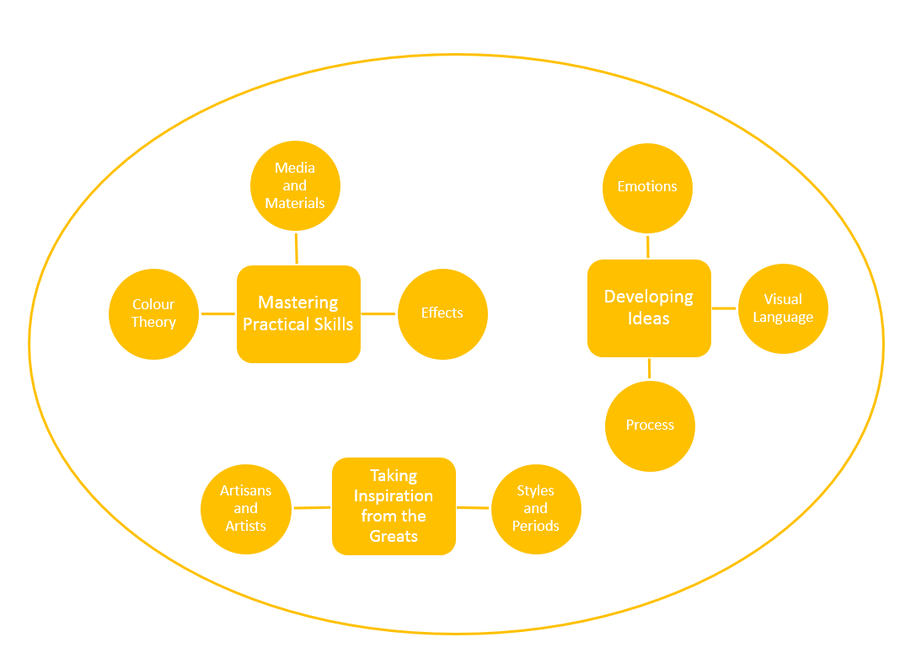Art and Design
Art and Design at London Fields Primary School
The Art and Design curriculum at London Fields has been designed to engage, inspire and challenge pupils, equipping them with the knowledge and skills to experiment, invent and create their own works of art, craft and design. It aims to provide the pupils with opportunities to think critically and develop a more rigorous understanding of art and design. Pupils develop an understanding of how art and design both reflect and shape our history, contribute to the culture, creativity and wealth of our nation.
Our Art and Design Curriculum develops essential characteristics of artists:
- The ability to use visual language skillfully and convincingly (for example, line, shape, pattern, colour, texture, form) to express emotions, interpret observations, convey insights and accentuate their individuality.
- The ability to communicate fluently in visual and tactile form.
- The ability to draw confidently and adventurously from observation, memory and imagination.
- The ability to explore and invent marks, develop and deconstruct ideas and communicate perceptively and powerfully through purposeful drawing in 2D, 3D or digital media.
- An impressive knowledge and understanding of other artists, craftmakers and designers.
- The ability to think and act like creative practitioners by using their knowledge and understanding to inform, inspire and interpret ideas, observations and feelings.
- Independence, initiative and originality which they can use to develop their creativity.
- The ability to select and use materials, processes and techniques skillfully and inventively to realise intentions and capitalise on the unexpected.
- The ability to reflect on, analyse and critically evaluate their own work and that of others.
- A passion for and a commitment to the subject.
How Art and Design is taught at London Fields
The Art and Design curriculum is designed to help pupils form an Art and Design schema within their long-term memories.
Schema theory states that all knowledge is organised into units. A schema is, therefore, a conceptual system for understanding knowledge.
Our Art and Design schema is a way of organising Art and Design semantic and procedural knowledge in a meaningful way; it is an appreciation of how facts are connected and the ways in which they are connected. It is distinct from information, which is just isolated facts that have no organisational basis or links.
Big Ideas help form the basis of the schema. Big Ideas are key concepts that underpin the subject. There are three Big Ideas in Art and Design:
- Taking inspiration from the Greats (Understanding how ideas develop through analysing art, creating art and using artistic processes.)
- Mastering Practical Skills (Developing practical skills so that ideas can be communicated.)
- Developing Ideas (Understanding how ideas develop through analysing art, creating art and using artistic processes)
Each Big Idea has facets of knowledge (knowledge categories) which help to strength the schema. Learning knowledge in each of the categories allows pupils to express and demonstrate their understanding of the Big Idea.
Over the course of an academic year, pupils experience a number of Art and Design topics in which the Big Ideas are returned to over and over again so the pupils gradually build understanding of them. Pupils also get opportunities to apply their knowledge and develop fluency in key procedural knowledge in other curriculum areas.
The EYFS curriculum prepares pupils for Art and Design in Year 1 and beyond by providing opportunities for pupils to explore different materials, tools and techniques freely and safely experimenting with colour, design, texture, form and function. They learn to join different materials together and use a range of materials and tools with care and precision. Pupils return to and build on their previous learning, refining ideas and developing their ability to represent them. Pupils also explore work by a range of artists and artisans, and continue to develop their ability to work collaboratively, sharing ideas and skills.
Click here for more general information about the curriculum.
Click here for more information about the EYFS curriculum.
Art and Design Trips, Visitors and Workshops
We strongly believe that trips, visitors and workshops are highly valuable for developing a deep understanding of the Big Ideas in Art and Design and bringing the subject to life. We are extremely fortunate to be based in London with a wealth of cultural opportunities at our fingers tips and easy accessibility to some of the country’s most prestigious Art and Design Venues. We are constantly looking for new experiences that will enrich the learning of our pupils. Previous enriching experiences have included:
- Artist Led session at the Tate Modern
- Portraits and People Workshop at the Royal Academy of Arts
- Bridget Riley workshop at the National Gallery
- Inspired by Nature worship at the William Morris Gallery
- Kehinde Wiley Exhibition at the William Morris Gallery
- Lino Print Workshop in school led by the Royal Academy of Arts
Art and Design at Home
There are lots of ways in which you can support your child with their Art and Design learning.
- Visit Art and Design Venues (many of the big galleries have free exhibitions you can explore!)
- Check our website for Art Competitions and recommendations for family Art and Design themed outings
- Talk about Art and Design in the world around you
- Ask your child about their Art and Design learning-they will have lots to tell you! (After each topic a slide show will be on the website documenting their learning journey so you can get your child to talk through their learning using the slide show)
- Encourage your child to have a sketch book- they can sketch anything they like, an object in the house, a tree in the local park, a scene when they are on holiday etc. Lots of famous artists developed their talent by keeping a sketch book!














